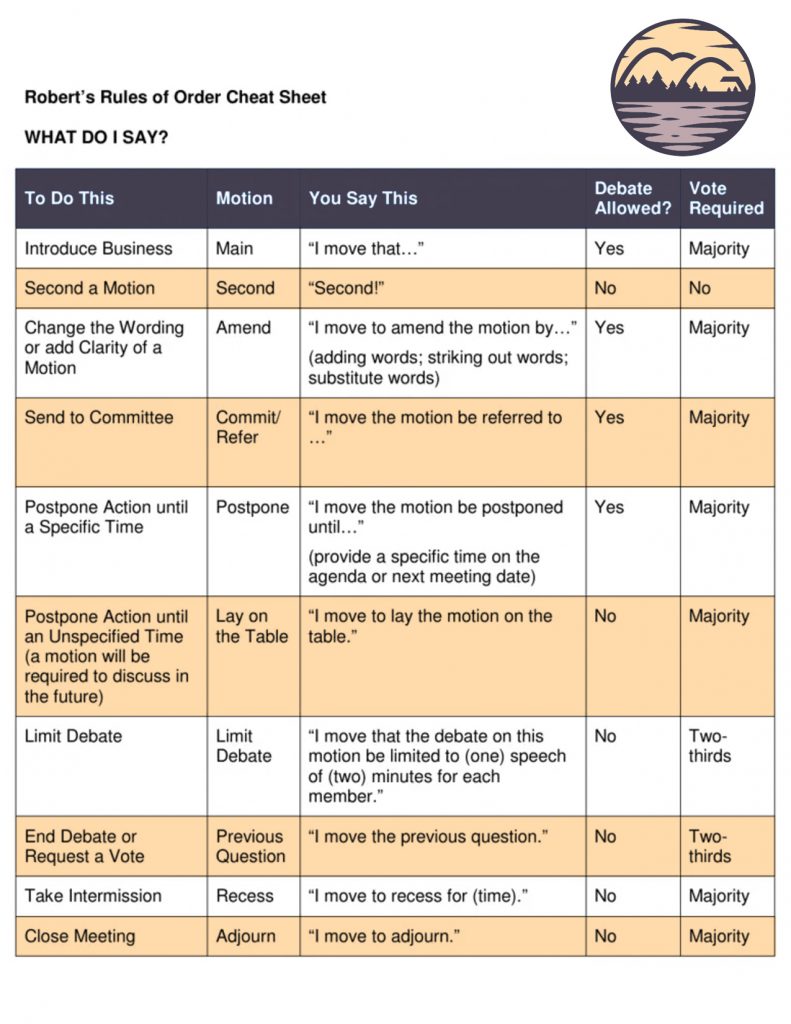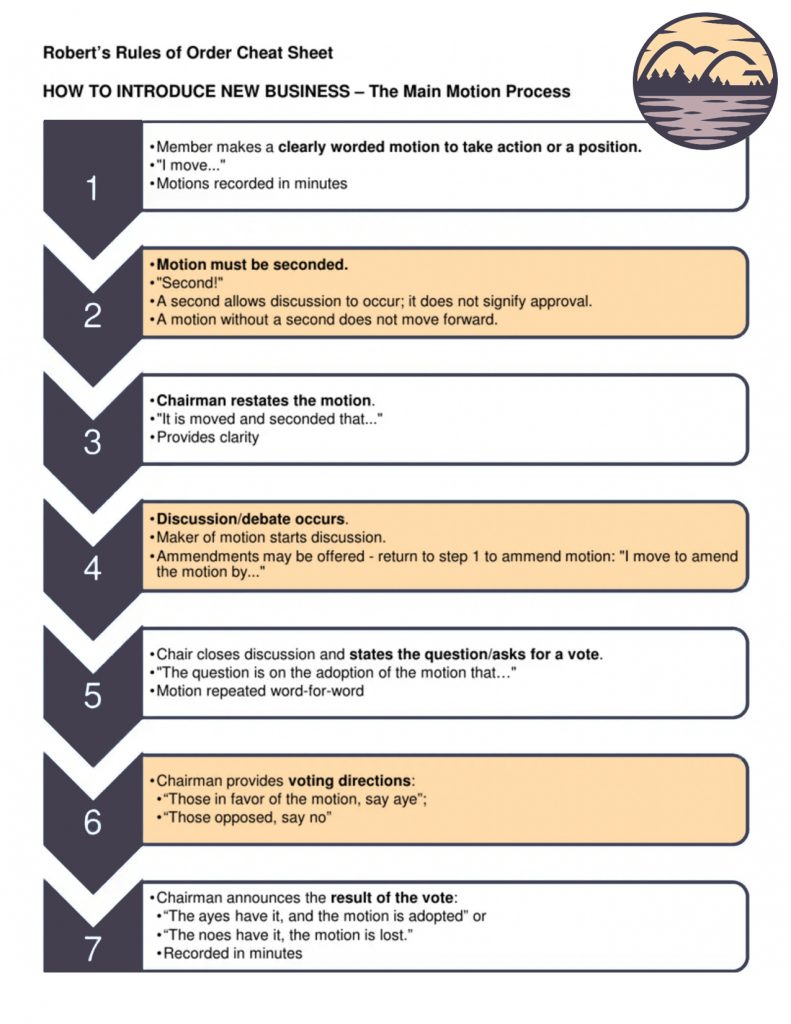
Meetings of the Mount Gilead Town Board of Commissioners typically include a segment dedicated to public comment. The purpose of this time is for members of the community and the general public to make their views known directly to the Town Board. To ensure a fair proceeding for all who wish to speak, please be aware of the following rules that will be observed during all public meetings:
- All persons wishing to speak shall do so from the podium to ensure an accurate record of testimony. No one is permitted to speak from the audience.
- Each person who has signed up to speak shall have one opportunity to speak for a period not to exceed 3 minutes in duration. The speaker will not be permitted to speak again once they leave the podium or thier 3 minutes expire.
- The Board requests that a group be represented by a spokesperson in order to keep repetitive testimony at a minimum. If this spokesperson is representing a group of more than 5 citizens, he/she is afforded the opportunity to speak for a period not to exceed 5 minutes.
- Town staff will note all comments and provide answers directly to citizens or make information available town-wide during department reports or at the next meeting.
- Inflammatory or immaterial testimony will not be allowed.
- In addition to the comment period during the public meeting, individuals can provide written comments to the Town Board of Commissioners by submitting them in writing to the Town Clerk.
How Meetings are Conducted
Once public comment is over, there will be no more room for public comment unless otherwise noted in order to proceed with the meeting agenda. There may be specific rules in place at a particular town meeting that prohibit interruptions, and often are. These rules will be outlined in the town’s meeting agenda, at the beginning of the meeting, or in the town’s code of ordinances. If you are unsure of the rules, it is always best to ask the chair of the meeting or the town manager before the meeting starts.
Our town meetings are run with Roberts Rules of Order. Roberts Rules of Order is a set of parliamentary procedure rules that are used by many organizations, including town governments, and even civic clubs. In Mount Gilead, North Carolina, the town commissioners and the mayor are required to follow Roberts Rules of Order when conducting town meetings, and so are participants of the meeting.
The mayor is the presiding officer of town meetings and has the power to:
- Adjourn the meeting
- Interpret the rules
- Rule on points of order
- Prioritize the agenda
- Call for a vote
- Break a tie vote (normally the mayor does not vote)
The town commissioners are responsible for:
- Voting on ordinances and policies
- Approving the budget
- Overseeing the town’s operations
- Serving as a liaison between the town and its residents
The town commissioners and the mayor are prohibited from:
- Showing favoritism
- Making promises that they cannot keep
- Abusing their power
- Engaging in personal attacks
- Disclosing confidential information
Roberts Rules of Order are designed to ensure that town meetings are conducted in a fair and orderly manner. They also help to ensure that the town commissioners and the mayor are held accountable for their actions.
Here are some additional details about what the town commissioners and the mayor can and cannot do:
- The mayor can adjourn the meeting if there is a quorum present and a majority of the commissioners agree to adjourn.
- The mayor can interpret the rules, but they must do so in a fair and impartial manner.
- The mayor can rule on points of order, but they must do so in a way that is consistent with the rules.
- The mayor can prioritize the agenda, but they must do so in a way that is fair to all of the commissioners.
- The mayor can call for a vote on any matter that is properly before the meeting.
- The mayor can break a tie vote, but they cannot vote on any matter that is being voted on by the commissioners.
- The town commissioners can make laws, but they must do so in a way that is consistent with the state constitution and state laws.
- The town commissioners can approve the budget, but they must do so in a way that is fiscally responsible.
- The town commissioners can oversee the town’s operations, but they must do so in a way that is efficient and effective.
- The town commissioners can serve as a liaison between the town and its residents, but they must do so in a way that is fair and impartial.
The town commissioners and the mayor are important elected officials who play a vital role in the governance of Mount Gilead, North Carolina. They ensure that town meetings are conducted in a fair and orderly manner and that the town is governed in a way that is best for its residents and based on equal community representation.
What is a Public Meeting?
Our town meetings are a public meeting that is by nature open to the public and may be recorded. This means that anyone can attend the meeting and participate in the discussion, but also that they may be recorded and any public comment potentially will be recorded in the meeting minutes.
There are a few things to keep in mind when attending a public meeting. First, you should arrive early to get a seat. Public meetings can often be crowded, and it may be difficult to find a seat if you arrive late. Second, you should be respectful of the other participants. Public meetings can be emotionally charged, and it is important to keep your behavior in check. Third, you should be prepared to speak up. If you have something to say, don’t be afraid to raise your hand and speak.
Public meetings are an important part of a democracy. They allow the public to participate in government and to have their voices heard. If you are interested in getting involved in your community, attending a public meeting is a great place to start.
Public comments are public record in North Carolina. This means that anyone can request to see public comments that have been submitted to a public body. However, there are some exceptions to this rule. For example, public comments may be considered confidential if they contain:
- Personal information, such as names, addresses, or phone numbers.
- Trade secrets or other confidential business information.
- Information that is protected by law, such as medical records or student records.
If a public body believes that a public comment is confidential, it must redact the confidential information before making the comment available to the public.
We are committed to transparency.
Public sunshine laws, also known as open meetings laws, are a set of federal and state laws that require government bodies to conduct their business in public. The public has a right to access public records, including public comments. This right is protected by the North Carolina Public Records Law. The Public Records Law is codified in Chapter 132 of the North Carolina General Statutes. These laws are designed to ensure that the public has a right to know about the activities of their government.
Open meetings laws typically require government bodies to:
- Hold their meetings in public.
- Give the public notice of their meetings.
- Allow the public to attend their meetings.
- Allow the public to speak at their meetings.
- Keep minutes of their meetings.
- Make the minutes of their meetings available to the public.
There are some exceptions to the open meetings laws. For example, government bodies may close a meeting if the discussion would involve:
- Confidential personnel matters.
- Pending litigation.
- Trade secrets.
- Other matters that the government body determines are necessary to discuss in closed session to protect the public interest.
If a government body closes a meeting, it must give the public notice of the closed meeting and the reason for the closed meeting. The government body must also keep minutes of the closed meeting, but the minutes may not include any information that was discussed in closed session. The minutes must be made available to the public upon request.
Public sunshine laws are important because they help to ensure that the public has a right to know about the activities of their government. These laws help to promote transparency and accountability in government.
Find out more about North Carolina public meeting laws here:
- North Carolina Open Meetings Law Handbook: This handbook provides a comprehensive overview of the North Carolina Open Meetings Law.
- North Carolina Attorney General’s Office: The North Carolina Attorney General’s Office enforces the North Carolina Open Meetings Law. You can file a complaint with the Attorney General’s Office if you believe that a public body has violated the Open Meetings Law.
- North Carolina General Statutes Chapter 143: This chapter of the North Carolina General Statutes codifies the North Carolina Open Meetings Law.
Here are some shorthand Robert’s Rules of Order sheets for how meetings proceed.



